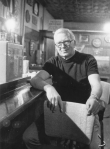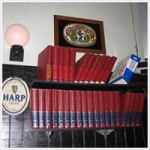Tags
boop, Chicago, cousin, cultural appropriation, Family, funeral, humor, Hyde Park, kitten, life of the mind, Mother, University of Chicago
Chicago and a swell funeral brought us together.
I was in college in Chicago when my mother told me one of my cousins had taken up residence in the Home For Unwed Nurses next to the university’s hospital. Naturally, I avoided her.
It wasn’t just that I had plenty of spare cousins. (Although my first-generation immigrant forebears had followed the commandment to “Be fruitful and multiply” so enthusiastically that a relative with fewer than six kids was considered practically childless. There may have been novenas.)
It wasn’t just that she came from an upscale suburb where every house was either beige with blonde brick trim or blonde brick with beige trim. (Although I was sure the girls there ironed their designer jeans and shaved their legs daily. Even in winter.)
It wasn’t just that she moved to my neighborhood. (Although voluntarily moving to Hyde Park on the South Side of Chicago seemed to me like voluntarily hitting yourself over the head. The best thing you can say about it is how good it feels when you stop. The worst thing is after a while, your head is a real mess.) I couldn’t figure out why anybody would choose Hyde Park (often described as “The circle of hell Dante forgot to mention”) when they could go someplace more pleasant, like a war zone.
![[NOTE: another blast from the past -- adapted from my column that originally ran in the Champaign-Urbana News-Gazette in 1991.] View of downtown Chicago from Hyde Park. Yup... this is pretty much the way I remember it. [Image credit: trbimg.com] http://www.trbimg.com/img-53017182/turbine/winter-weather-climate-change-20140216-001/1024/1024x650](https://barbtaub.com/wp-content/uploads/2016/10/winter-weather-climate-change-20140216-001.jpg?w=529&h=336)
Hell does freeze over. View of downtown Chicago from Hyde Park. Yup… this is pretty much the way I remember my years on Chicago’s South Side… [Image credit: trbimg.com]
As the logo on my old college t-shirt proclaimed, our campus was “Where Fun Goes To Die“. (My roommate’s shirt went old school with, “Ubi iucunditas moritur“, while my husband always preferred his shirt’s statement, “That’s all well and good in practice…but how does it work in theory?“)

[image credit: Rachel Helene’s Facebook post]
Okay. The real reason I was avoiding her? She was beautiful. Her whole family was beautiful. As for my own family, Sister #6 nailed it. “Out of all ten of us, I’m the best looking one and I’m only cute.”
Luckily, glamour was not a prerequisite to a successful social life in Hyde Park. This was only partly because there was no social life in Hyde Park. Did you ever wonder what became of that grade-grubbing, geeky nerd in your high-school class? Well, they say home is the place where, when you go there, they have to take you in. Hyde Park took us in.
We called it “The Life of the Mind”. But let’s face it—the mind doesn’t throw nearly as good a party as the body, especially those parts of the body that make 99% of college kids’ social decisions. In other college towns during my university years, kids with normal social lives were out getting arrest records. We were out getting mugged. My only brush with the law came the night I was walking home late from Jimmy’s, Hyde Park’s sole college bar. A squad car pulled up next to me. Over the loudspeaker boomed the Mephistophelian voice of another of my cousins: “BARB, DOES YOUR MOTHER KNOW YOU’RE OUT AT THIS HOUR?”

Jimmy Wilson in Jimmy’s, the only actual college bar serving the University of Chicago’s alcohol-consumption needs.

Really? Your college bar didn’t included the complete works of Shakespeare and the Encyclopedia Britannica? That you actually used? Regularly? What did you do in that bar?
So naturally, when I heard that Miss America in a nurse’s cap had moved to the neighborhood, I greeted the news with the enthusiasm usually reserved for active plague carriers. She was no more anxious to meet me. The first person she saw when she got to Hyde Park was standing in the middle of the street having a heated argument (which he appeared to be losing) with himself about a dog. It was, I must point out, some decades before cellphones gave people a reason to talk out loud when nobody was there. In Hyde Park, talking to yourself–and answering–has never been uncommon. It might mean you are a Nobel Prize-winning scientist. It might mean you are a rubber-room refugee. Sadly, it often might mean both.
Soon after this, she met some people who beat her with pointed sticks for refusing their request that she hand over her bike. What really bothered her was the universal Hyde Park response that this was her fault for not having cash for the muggers. The first thing Hyde Park residents learned was to always carry an extra ten dollars for the mugger. (I did hear of a case where an impoverished graduate student’s mugger agreed to take a check…)
She was also disconcerted by the main topic of conversation at social gatherings. Roaches. You could guess one’s academic discipline from their preferred methods of roach removal. These ranged from the hard scientists employing biological warfare/chemical agents/engines of destruction, to the philosophers who questioned the roaches’ reality.

Parent-enforced friending in a pre-facebook world. [image credit: memecenter.com]
But after about six months of increasing maternal pressure on both sides, we finally agreed to meet for dinner. Each of us brought along a friend whose sole function was to rescue us from potentially flagging conversation with a reminder about the three term papers/nursing shifts due in the morning. Don’t judge. Escape was hard in those prehistoric days BC (before cellphones).
To The Hub, our worry about finding conversational common ground is the funniest part of the story. When you come from large families like both mine and my cousin’s, you learn to talk early and often, and to follow at least three simultaneous conversations. He thinks if Eve had been in our family, we would never have left the Garden of Eden because the snake wouldn’t have gotten a word in edgewise.
And, in fact, the wing-friends listened in horrified silence as we got on the subject of my grandmother’s swell funeral.
“Did you know about the Great-Uncle who was too cheap to rent a hotel room, so he slept in grandma’s bed?”
“How about the one who snuck out of the funeral early so she could put her name on Grandma’s things that she wanted?”
“Can you believe how smashed those cousins got at the restaurant after?”
“And who were those two swabbing each other’s tonsils out in the hall?”
“Too bad Grandma missed it–she would have had a ball.”
We got through the entire evening without ever mentioning roaches. I forgave her for being beautiful; she forgave me for being a Hyde Parker. I taught her my method for roach removal; she taught me how to apply eyeliner. We ended up sharing an apartment until she got married.
And we owe it all to Grandma’s swell funeral.
For a completely different Chicago experience, please see my review of Lorraine Devon Wilke’s stunning contemporary fiction, The Alchemy of Noise.
Review #3
The Alchemy of Noise by Lorraine Devon Wilke
- Genre: Contemporary literary fiction
- Author: Lorraine Devon Wilke
Blurb:
In a world so full of lonely people and broken hearts, Chris Hawkins, a black sound engineer from Chicago’s south side, and Sidonie Frame—white, suburban-raised, the head manager of one of the city’s most elite venues—meet by work-related happenstance and fall quickly in love, convinced that by that act alone they can inspire peace, joy, and happiness in the world around them. The world, however, has other ideas.
Their meeting is serendipitous. Chris, who owns and runs his company, largely spends his time surrounded by members of his own community; Sidonie, conversely, is rarely outside the environs of work and its predominantly white staff and clientele. But when the club’s sound manager goes AWOL on the night of a big event and Chris is hired to come in as a last-minute replacement, their destinies collide.
Immediately drawn to each other, they fall quickly into an unexpected and thrilling relationship, inspiring myriad reactions amongst family and friends on both sides of the racial divide. But even as their love story evolves, day-to-day tensions, police disruptions, and the microaggressions Chris constantly encounters as a black man in the gritty environs of Chicago become a cultural flashpoint, challenging Sidonie’s privileged worldview and Chris’s ability to translate the unfolding events. After a random and gut-wrenching series of police encounters shakes their resilience, it’s the shattering circumstance of a violent arrest—one in which Chris is identified as a serial vandal and potential rapist—that sends their world into free fall.
He claims his innocence; she believes him. But the forces pushing against them are many and oppressive. With a looming trial, the dissipating loyalties of key allies, and unforeseen twists triggering doubt and suspicion, Sidonie and Chris are driven to question what they really know of each other and just whom to trust, leading to a powerful and emotional conclusion.
Lorraine Devon Wilke’s third novel, The Alchemy of Noise, ventures beyond the humor and pathos of family drama explored so cleverly in her first two novels to dig deep into the politics of contemporary culture. At its heart a love story, it explores the complexity of race in a suspenseful drama driven by issues of privilege, prejudice, police profiling and legal entanglements, and the disparities in how those provocative themes impact the various and diverse characters involved.
 My Review: 5 out of 5 stars
My Review: 5 out of 5 stars
We once lived in Champaign Illinois, where the University of Illinois’ team mascot, Chief Illiniwek, embraced almost every type of cultural stereotyping, from his eagle-feathered war bonnet to his frenzied war dance. Growing calls for The Chief to be retired were opposed—loudly and backed up with considerable donations—by alumni, locals, and even students. My neighbors told me they honestly believed the mascot was “honoring” Native Americans, and couldn’t understand what the fuss was about. Despite the complaints of Native Americans including descendents of the Illini tribes, the mascot continued his war dance for almost a century before finally being retired in 2007. Of the 35 men and one woman who served as the mascot, not one was a Native American.
Cultural appropriation, at times also phrased cultural misappropriation, is the adoption of elements of one culture by members of another culture. This can be controversial when members of a dominant culture appropriate from disadvantaged minority cultures. —Wikipedia
In Lorraine Devon Wilke’s troubling and stunningly well-written new book, The Alchemy of Noise, cultural appropriation is the elephant in the room. On the surface, this is a love story between two educated, attractive, and articulate people. Sidonie is manager of an upscale club, The Church. Chris is a sound engineer, owner of his own company, Sound Alchemy. Their tastes and careers overlap, they are sophisticated, successful, and they come from different races.
The alchemy of the title—and the name of Chris’ company—refers to the ancient philosophy of refining materials, purifying them, often turning base metals into precious ones. In this case the alchemy refers to noise, and to the power to transform that noise into beautiful sound. But can Sidonie and Chris create and sustain the alchemy to transform all the noise around them into their own beautiful music?
In this narrative, white middle-class Sidonie sees no reason why she shouldn’t fall in love with black entrepreneur Chris. As she tells him, “I’ve never had to think much about it before; race didn’t affect me.” But she has to think about it when being with Chris means experiencing the endless stream of casual and calculated discrimination and even abuse, the constant questions about whether it’s safe or smart or worth the trouble to do something as simple as walk down a street in your own neighborhood.
Sidonie’s shock and fury are new to her. But that doesn’t prepare her for the generic, ingrained contempt displayed by those she thought she knew—close friends, colleagues, family. Even as Sidonie and Chris painfully navigate these new and dangerous shoals, Chris is arrested, beaten, and accused of raping a child. Sidonie rejects and fights against the casual willingness of police and officials to ignore details like fabricated ‘proof’ or unabashed lies.
But as time passes, the damage is done to both of them and to their fragile new relationship. Chris’ sister Vanessa accuses Sidonie of leading Chris to betray his race. He doubts his own ability to keep fighting. And in a moment when all she’s heard seems to support the unthinkable possibility that there is truth in the accusations, Sidonie’s own love and faith falter.
There are supporting characters who play important roles in the story and in Chris and Sidonie’s relationship. First, there are the mothers. Chris’ wise and well-educated mother Delores—whose unwavering belief in her family holds them together in their darkest hours—contrasts with Sidonie’s sheltered and ultimately weak mother Marian, who runs at the first sign that her daughter needs her support.
Also set up as a contrast are the two sisters. Chris’ sister Vanessa is a force of nature, powered by her volcanic fury at the way the world works. Her inability to step away from this destructive anger has destroyed her marriage and led her to accuse Chris of betraying his race. Sidonie’s sister Karen is immediately warm and supportive of the new relationship. Her prosperous lifestyle as a partner at a ‘prestigious downtown firm’ was made possible when she left her early criminal defense career, something Vanessa would undoubtedly see as selling out.
Another influential minor character is Chicago itself. Sidonie comes from the homogenized northern suburb of Palatine. “Palatine exuded an insistently beige, generic curb appeal.” Chris’ family home is in that liberal bastion of the intellectual, Hyde Park, home to the University of Chicago. “With its unusually robust campus police force, and wealthy, prestigious demographic, Hyde Park was a kind of island in the midst of encircling urban grit.” Palatine and Hyde Park are separated, as with most of Chicago, by the Dan Ryan Expressway, the dividing line between white and non-white neighborhoods. In between is the city itself, with its horrific heat, sneaky pretend-spring days, and spectacular skyline. “Making their way past Wrigley Field, which luckily, was dark tonight, the view was quintessential Chicago: lights, color, the palpable sense of energy.”
Chicago is also a dark force, the city where a person of color has to calculate every move, ignore every casual insult, cope with every suspicion and danger waiting just because of skin color. Part of this is Chicago’s police force, here depicted as both vicious, bigoted old-school bullies and nice guys like the surprisingly diffident Officer Mike who rescues Sidonie from being arrested, but also tries to justify his fellow officers.
Look, I like you, I like Chris, but I gotta defend my department too, because I don’t think you get the full picture. I know lots of cops who come to the force completely unbiased, totally unprejudiced; ready to treat everyone on equal terms. But when you’re a cop in Chicago, you deal with black crime on a regular basis, day in and day out. It’s hard and it’s ugly and it can change you; it can make you a racist.
Like Sidonie, I’ve never lived in Chris’ world so I can’t say how accurately it’s portrayed. I have relatives who served on the Chicago police force, good people who are loving family members. Would they see themselves in the police depicted here? Would they recognize their colleagues?
Ultimately, this is a love story. But is it one the author has the right to tell? As she explains in her Notes, she was in a similar mixed race relationship for years. The emotions she describes are the ones she learned and lived. The writing of The Alchemy of Noise is hauntingly beautiful, shocking, and compelling. I feel like I know so many of the characters, that they are the family and friends and fellow students I knew in Chicago. And yet I don’t know them at all, can’t believe they would react as the characters did here. But, as Sidonie points out, I’ve read the papers, listened to the news, heard the casually racist and discriminatory remarks. And even with a love as big as Chris and Sidonie’s, I don’t know how you get past that. Maybe reading this stunningly well written book is a good way to start.
Discover more from Barb Taub
Subscribe to get the latest posts sent to your email.




This sounds beautiful and beyond my understanding. Something i need to read.
LikeLiked by 1 person
Thank you, Barb, for your candid, thought-provoking take on my book. You are such a good writer you make even the questions that are piqued read as good prose! I’m honored that you read… that you wrote. Thank you.
LikeLike
I lived in Chicago during the time of Boss Daley and my ex-husband was born in Hyde Park. We visited there a few years ago – on the surface it seemed a bit tamer but who knows. I’m afraid attractive people are judged to be shallow as often as plain people are thought to have great personalities. Good on you for this honest account.
LikeLike
This is a brilliant review for a book I loved too, Barb. Like you say, stunning…
LikeLike
Thank you, Georgia Rose… you know I’m a fan of yours, as well!
LikeLike
The book looks interesting! I will never look at the letters BC the same way again: now it’s Before Cellphones, Before Children or perhaps Barb’s Call!
LikeLiked by 1 person
Wonderful review. Definitely one to add to the tbr pile.
LikeLiked by 1 person
Hilarious!
LikeLiked by 1 person